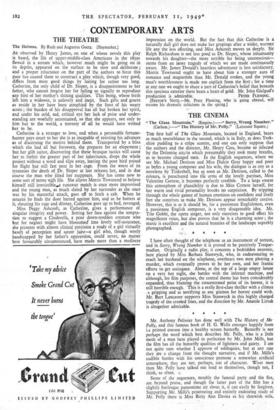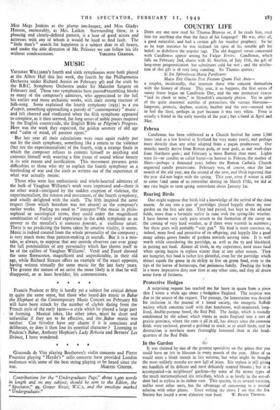THE CINEMA
"The Glass Mountain." (Empire.)—" Sorry, Wrong Number." (Carlton.)—" The History of Mr.'Polly." (Leicester Square.) THE first half of The Glass Mountain, located in England, bears as much resemblance to the second, which is in Italy, as does York- , shire pudding to a crepe suzette, and one can only suppose that the authors and the director, Mr. Henry Cass, became so infected by the Dolomite air4rin which presumably they took many breaths, as to become changed men. • In the English sequences, where we see Mr. Michael Denison and Miss Dulcie Gray happy and poor as befits a young composer and his wife, the dialogue is as coy as a novelette by Tinkerbell, but as soon as Mr. Denison, called to the colours, is parachuted into the arms of the lovely partisan, Miss Valentine Cortese, it becomes perfectly credible. To a large extent this atmosphere of plausibility is due to Miss Cortese herself, for her warm and vivid personality brooks no scepticism. By tripping through the whole gamut of human emotions on confident and lively feet she contrives to make Mr. Denison appear remarkably costive. However, this is as it should be, for a passionate Englishman, even a passionate English composer, is a very disagreeable idea. Mr. Tito Gobbi, the opera singer, not only exercises to good effect his magnificent voice, but also proves that he is a charming actor ; the music is excellent kotl the natural beauties of the landscape superbly photographed. , * * * I have often thought of the telephone as an instrument of torture, and in Sorry, Wrong Number it is proved to be positively Torque- madian. Originally a radio play, it concerns a bedridden neurotic, here played by 11eilss Barbara Stanwyck, who, in endeavouring to reach her husband on the telephone, overhears two men plotting a murder, which eventually proves to be her own, and her frantic efforts to get assistance. Alone, at the top of a large empty house on a very hot Mat, she battles with the infernal machine, and although, for film purposes, the central theme has been considerably expanded, thus blunting the concentrated point of its horror, it is • still horrible enough. This is a really ,first-class thriller with a -Climax ..s gripping and as terrifying as any giutton for horror could wish. Mr. Burt Lancaster supports Miss Stanwyck in this highly charged tragedy of the crossed lines, and the direction by Mr. Anatole Litvak is altogether admirable.
* * Mr. Anthony Pelissier has done well with The History of Mr Polly, and this famous book of H. G. Wells emerges happily from iis printed cocoon into a healthy screen butterfly. Butterfly is not perhaps the word which best describes Mr. Polly, who is a little moth of a man here played to perfection by Mr. John Mills, but the film has all the butterfly qualities of lightness and gaiety. I am not quite sure whether I approve of soliloquies, but at any rate they ate a change from the thought narrative, and if Mr. Mills's audible battles with his conscience promote a somewhat artificial atmosphere, they are not, perhaps, out of character. Wiser men than Mr. Polly have talked out loud to themselves, though not, I think, so often. Iv, Some of the sequences, notably the funeral party and the fire, are beyond praise, and though the latter part of the film has a slightly burlesque pantomime air about it, it can easily be forgiven. Supporting Mr. Mills's penetrating and entirely endearing study of Mr. Polly there is -Miss Betty Ann Davies as his shrewish wife,
Miss Megs Jenkins as the plump inn-keeper, and Miss Gladys Henson, memorably, as Mrs. Larkin. Surrounding these, in a pleasing and clearly-defined pattern, is a host of good actors and actresses with any of whom it would be hard to find fault. The "little man's" search for happiness is a subject dear to all hearts, and under the able direction of Mr. Pelissier we can follow his life







































 Previous page
Previous page